- Home
- Dornford Yates
As Berry and I Were Saying Page 7
As Berry and I Were Saying Read online
Page 7
“I’d been there about two years, when I entered Brick Court one morning, as I had done – well, hundreds of times before. I walked upstairs, opened our own front door and entered the nice, square hall. At once I noticed that the clerks had moved the hat-stand – you know: a mahogany thing, with hooks for hats and coats and a rack for umbrellas or sticks. I supposed they had some good reason, so I took off my coat and hat and hung them up.
“Top-hat, of course,” said Berry.
“Of course. This was before the first war. When I was a Judge’s Marshal, I always wore morning dress – in the county towns, I mean. And nobody found it strange, when I walked about the streets.”
“You’d be mobbed now,” said Daphne.
“Yes, I suppose I should. Well, I hung up my hat and coat and walked into Harker’s room, as I always did. Harker hadn’t arrived, but there was a stranger there…sitting at Harker’s table…staring at me…
“Well, I stared back. I mean, the man wasn’t waiting – he was at work on some brief…and sitting at Harker’s table…in Harker’s room…
“Well, we stared at each other in silence.
“Then something made me throw a glance round. The room was different. The red leather chair was gone, and instead of the one engraving, two cartoons by Spy were above the mantelpiece.
“A frightful thought came to my mind.
“‘My God,’ I said. And then, ‘Tell me, is this the third floor?’
“He nodded.
“‘That’s right. The third floor,’ he said.
“I never remember feeling such a fool. I had walked past our front door on the second floor, and climbed to the third, there to invade the privacy of the chambers exactly above. Except for the furniture, they were exactly like ours. And much of the furniture was the same.
“Consumed with mortification, I did the best I could. I apologized abjectly, explained that I belonged to the chambers below and that for some strange reason, for which I could not account, I must have walked up three flights, instead of two.
“From being pardonably sticky, the fellow became quite civil and said it didn’t matter at all. Perhaps it didn’t to him: but it did to me. I bowed myself out of his room, slunk through the hall, picked up my hat and coat and stole downstairs, like a thief.
“Harker hadn’t arrived, so I sat down in front of his fire and wondered what he would say, when he heard what I’d done. I was still too hot and bothered to look at The Times.
“About seven minutes later Harker arrived.
“I think I shall always see him, standing in the doorway of his room, with his hat on the back of his head and his overcoat over his arm, staring at me, with his hand clapped fast to his mouth.
“‘Whatever’s the matter?’ I said, and got to my feet.
“‘Boy,’ he said, ‘I’ve done the most awful thing. The most damned awful thing that I’ve ever done.’
“‘Tell me,’ said I. But I didn’t have to be told. I knew. His words and his demeanour were too familiar.
“‘Well,’ he said, ‘I entered the hall, as usual, and the first thing I noticed was that the clerks–’
“‘–had moved the hat-stand,’ said I. ‘You needn’t go on. Ten minutes ago I did the very same thing. Walked into the chambers upstairs and into your room.’
“‘Oh, I can’t believe it,’ said Harker. ‘And a fellow sitting at my table?’
“‘That’s right,’ said I. ‘He didn’t seem too pleased, but he thawed a bit when I crawled – as I had to do.’
“‘That’s more than he did with me. His manner was just black ice. And how could I protest? I never felt such a fool in all my life.’
“‘You can hardly blame him,’ said I. ‘Once, yes. That is just possible. But twice in the same ten minutes…’ I shook my head. ‘Of course he’s now convinced that we were having him on.’
“Well, there we are. That is exactly what happened. And to this day, I cannot imagine why. I went out and scanned the staircase, to see if there was something which might have misled us both. But there was nothing at all.”
“That,” said my sister, “is most remarkable.”
“Yes,” said Berry, “it is. And I think that it should go in. It’s evidence of something supernatural. On that particular morning some influence was at work in Number One Brick Court. An evil spirit or something was playing his knavish tricks.”
“And the man was a stranger?” said Jill.
“Yes,” said I. “That he had the chambers above means nothing at all. You can live above or below a man in The Temple for five years or more – and never know him by sight. Gill’s chambers were below ours. Though we used the same stairs, I never saw him there once.”
“Did you ever know a coincidence in a case?”
“I did – on one occasion. No damage was done. But there were two coincidences – each of them very strange. The whole of the tale is strange, and only about one-fifth has ever been told. Perhaps, if I changed some names…”
“We’ll leave that to you.”
“Madame la Comtesse de B— was the most remarkable woman I ever met. Her virtues were outstanding, and she had glaring faults. Her personality was the most powerful I ever knew. I never met her until she was fifty-five, but in her youth she must have been dazzling, indeed. For her own sex, she had a profound contempt: her conversation was brilliant; her sense of humour was rare. She was immensely rich.
“One summer’s day, when she was in Austria, a cable arrived from London. This was how it ran. Have been robbed please cable me twenty pounds George Dixon.
“Now she knew George Dixon well. He was an English prelate of the Roman Catholic Church. I came to know him, too. And I feel bound to say, although I am not a Roman Catholic, that Monseigneur Dixon would have greatly distinguished the English Catholic Church.”
“You put him in Anthony Lyveden and Valerie French.”
“Yes, I did,” said I. “He was Cardinal Forest. In fact Dixon never lived to get the red hat. He would have had it, if Pius the Tenth hadn’t died: for the latter was very fond of Dixon: he used to call him ‘Dixon meus’. But all of that’s by the way.
“Madame de B— knew Dixon very well; and she knew that he was in England, on leave from Rome. But she did not believe that the cable had come from him, for he had friends in England to whom he could have applied. Yet she dared not ignore it, in case he was the sender and needed her help. The office of origin was on the Surrey side: the address was that of a house in a London Street; but she did not know London well, so these things didn’t help. And so she cabled the money. At the same time she wrote to Dixon’s address in Rome, to which she knew that he would shortly return.
“In a few days’ time she had another cable. This came from Rome. No such cable was ever sent by me George Dixon. This confirmed her suspicions that she had been fooled. And Madame de B— was the wrong sort of woman to fool.
“Now she instantly made up her mind that the fraudulent cable had been sent by a play-boy she knew very well. (Their relation was strictly moral; but her acquaintance was wide.) He was, she knew, in England at the time at which the cable was sent, and they had lately quarrelled – he and she. No doubt this was his idea of twisting her tail. She decided that he must be taught that such ideas did not pay. So she wrote to her London detective – a first-rate man.
“The detective soon reported that the address on the cable was what is known as an ‘accommodation address’: it was, in fact, that of a small tobacconist’s shop in a street which ran a stone’s throw from Waterloo. The woman and her daughter, who kept it, remembered ‘Mr George Dixon’ and they described the play-boy without any prompting at all. That was enough for Madame de B— , and she instructed her detective to seek a warrant at once. He respectfully replied that such information would not be enough for the Court and that identification must take place.
“Now the play-boy was French – a younger son of a very great family. He hadn’t a bean, but he was one of those blok
es who never sink lower than the Ritz.”
“That,” said my wife, “is out of one of your books. She Fell Among Thieves, I think.”
“You’re right,” said I, “and I apologize. But it exactly describes him.”
“It exactly describes,” said Berry, “a lot of wallahs I’ve met. How the hell they do it, I’ve no idea. But you’ve got to hand it to them, and the fact remains.”
“Well, the play-boy was French, and he was back in France. In fact, he was at the Ritz. So the mother and daughter, who kept the tobacconist’s shop, were taken over to Paris at vast expense. There they were put in a taxi, to sit outside the Ritz and take a look at the people who went in and out. After about three hours the play-boy appeared. At once, both women rose up and cried out, ‘That’s him.’
“Well, that was good enough. The women returned to London, an information was sworn and a warrant for the playboy’s arrest was issued forthwith. But the offence was not an extraditable offence. Still, the play-boy was often in England, and every boat-train was met for week after week.
“I’m afraid I’ll have to go back. Before the information was sworn, a statement was taken from Dixon. No, he had not sent the cable. He’d never been robbed. Where was he at such and such a time on such and such a day – the time and day on which the false cable was sent. Well, where do you think he was? He was walking about the mean streets that neighbour Waterloo. That morning he’d come from Hampshire to Waterloo. He was on his way to Southampton, en route for Rome. And he had an hour and a half to wait for his train. So he left his luggage with a porter and went for a walk. As like as not, he passed the office of origin at the very moment at which the cable was being dispatched. Dispatched in his name. Perhaps you can beat that. I can’t. It was, of course, the purest coincidence: but, brought out in cross-examination, it would have sounded strange.”
“I’ll say it would,” said Berry. “They couldn’t have put him in the box.”
“I told them as much,” said I. “And he came to me about it and asked what I thought. ‘The defence may not get it,’ I said, ‘but if they do, I must tell you frankly they’ll fairly lam it in.’ ‘I didn’t do it,’ he said. ‘You don’t have to tell me that, sir. But you must see that of all coincidences it is the most unfortunate that any evil spirit could have devised.’ ‘Perhaps,’ he said, ‘perhaps it won’t come to that.’ ‘I don’t think it will,’ said I. And I was perfectly right.
“The weeks went by, but the play-boy stayed fast in France. ‘He’s afraid to return to England,’ said Madame de B— . So we all thought.
“Late that summer, S F Edge, the famous racing motorist, was spending a fortnight at Ostend. One day he received a cable. Have been robbed please cable me twenty pounds. And the cable was signed with the name of a close friend of his. But S F Edge wasn’t deceived, for the friend in question had joined him in Ostend the day before. Edge cabled to Scotland Yard – and a man was sent at once to the accommodation address…
“The culprit was a clerk in the cable office. As soon as he was arrested, he threw in his hand. He confessed to sending both cables and to having obtained twenty pounds by sending the first. He was committed for trial and presently appeared at the Old Bailey, where he pleaded guilty. Madame de B—’s solicitors sent me a watching brief. And so I saw the man. If you’d put him beside the play-boy, you could hardly have told them apart.
“So that was that. But Madame de B— wouldn’t have it. She always maintained that the play-boy had sent the first cable to twist her tail.”
“That was childish,” said Daphne.
“Of course it was,” said I. “But I said she had glaring faults.”
“Dixon wasn’t called?”
“No. The Crown only proceeded on the S F Edge case, and, before he was sentenced, the prisoner asked that Madame de B—’s case should be taken into account.”
“So nothing about the first case ever came out?”
“Nothing. I don’t think her name was mentioned. It was very much better so.”
“Poor Dixon must have been thankful.”
“I’m sure he was. For such a man, it was a most unpleasant position, and had the play-boy been charged – and had he come to London before Edge’s cable was sent, he certainly would have been charged – well, Dixon’s position would have been dreadful, indeed. For he had met the play-boy at Madame de B—’s.”
“And the play-boy might have gone down?”
“He might indeed,” said I. “In any event, it would have been a hell of a case.”
“God bless my soul,” said Berry. “How little we really know about such things. Have you got any more?”
“I remember half a coincidence. Perhaps a fair description would be ‘a curious chance’. But it did concern a well-known murder case.”
Berry rose and poured me a glass of port.
“I quitted Treasury Chambers in 1910: from there, as I have told you, I went to Brick Court. In Treasury Chambers I’d been Travers Humphreys’ pupil. And the last thing I did with him was the Crippen case. I’ll deal with that later on, but not tonight. Some three months after I’d left him, an old lady died and was buried in Camden Town. At least, that was where she died. For two or three years she had been a paying guest – with some people whose name was Balsam. She was a very paying guest, for she left Balsam all she had and he had insured her life for quite a big sum. I imagine it was the Insurance Company that asked the first questions of all and didn’t like the replies. Be that as it may, two or three months later the old lady’s body was exhumed. Less than a week after that the Balsams, husband and wife, were under arrest. The charge was wilful murder. And when the Crown opened its case, it disclosed that considerable traces of arsenic had been found in the old lady’s body and alleged that this terrible poison had been administered by her hosts. Now the Balsams employed a solicitor whom they knew. He lived not far from them and he was a personal friend. And he briefed Gervais Rentoul, a son of the Judge. (He wasn’t a High Court Judge, but he sat at the Old Bailey and the City of London Court. He was one of the best after-dinner speakers I ever heard. He used to write his letters on the Bench. And, if ever I was before him, he always showed me a kindness which I in no way deserved. In spite of his correspondence, he always did very well. Some people were funny like that. Knowing that I wrote in my spare time, the Senior Chancery Registrar once asked me to recommend him some books. ‘I get so bored in court, sitting under the Judge.’) I knew Rentoul quite well. We’d been at Oxford together and he was called to the Bar a year before I. And this was his first big brief. Travers Humphreys appeared for the Crown. And the case began to take shape.
“One day, before making for The Temple, I drove to the Stores. Then I walked to St James’s Park and took the train. When I entered one of the coaches, there was Travers Humphreys all by himself. I went and sat down by his side, and we passed the time of day. Presently–“‘The King against Balsam,’ I said. ‘Crippen repeats himself.’
“‘I wish he would,’ said Humphreys. ‘It’s not so good.’
“‘Why, what’s the trouble?’ said I.
“Humphreys lowered his voice.
“‘We can’t prove possession of the poison.’
“‘Oh dear,’ said I.
“‘Exactly. He did it all right. You can take my word for that. But proof is another matter. If we can’t prove possession, Balsam is going to get off. And he oughtn’t to get off, for this is a wicked case.’
“He had my sympathy. The Balsams had been charged and at the second hearing he’d had to open the case. And now he had got to prove it. And, as things stood, he couldn’t prove it. He could allege that Balsam had administered the arsenic: but when Balsam swore that he had never had any arsenic to administer, his statement could not be countered. I mean arsenic’s not like flour. You can’t buy it by the pound.”
“In Crippen’s case, you had it.”
“Oh, yes. Crippen was a quack doctor. He made up drugs. And in some of the drugs
he made up, he used hyoscine. And hyoscine was the poison with which he poisoned his wife.
“Well, we walked to The Temple together, and he went to Paper Buildings and I to Brick Court. I hadn’t been there half an hour when my clerk came into the room. Would I speak to Mr Rentoul? I told him to put him through. Rentoul wanted to know if I’d a few minutes to spare. I said I had. ‘May I come round and see you?’ ‘Of course.’ ‘You’re quite alone?’ ‘Yes.’
“Five minutes later Gervais Rentoul arrived.
“He sat very close to me and spoke very low.
‘I want your advice,’ he said. ‘You’ve been in Treasury Chambers and know the ropes. Well, I’m defending the Balsams, as you know. Now, entirely between you and me, the prosecution is stuck. They can’t prove possession of the poison. And unless they can prove that, they won’t get home.’
“‘I see,’ I said. ‘Go on.’
“‘Boy,’ he said, ‘this is strictly between you and me.’
“‘Of course,’ said I. ‘You know I never talk.’
“‘Well, the thing is this. There were fly-papers in the house for some time before her death.’
“‘The devil there were.’
“‘There were. Now should they get hold of that fact, they will suggest that the victim was poisoned by the water in which the fly-papers were soaked.’
“‘They certainly will,’ said I. ‘Everyone knows that–’
“‘Not so fast,’ says Rentoul. ‘Does everyone know? I know it’s a popular belief that you can poison a person by giving him that water to drink. But has that ever been proved?’
“‘I believe it has,’ said I. ‘But that was some time ago.’
“‘The solicitor doesn’t believe it, and I’m not sure.’
“‘Well, if they get it, the Crown will have its analysts and so can you.’
“‘The solicitor says we should be ready, in case they do.’
“‘What ever d’you mean?’
“‘Well, he wants to get some fly-papers and see for himself.’

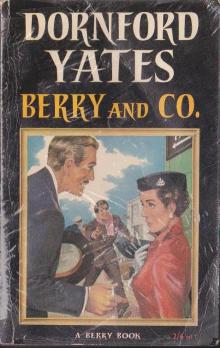 Berry and Co.
Berry and Co. Jonah and Co.
Jonah and Co. The Funny Bone: Short Stories and Amusing Anecdotes for a Dull Hour
The Funny Bone: Short Stories and Amusing Anecdotes for a Dull Hour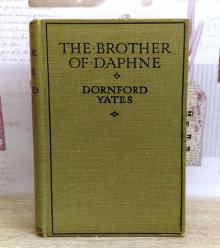 The Brother of Daphne
The Brother of Daphne Courts of Idleness
Courts of Idleness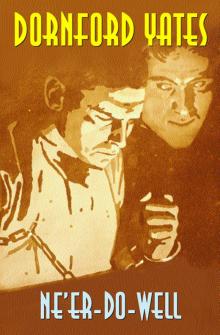 Ne'er Do Well
Ne'er Do Well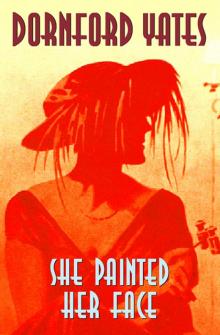 She Painted Her Face
She Painted Her Face Safe Custody and Laughing Bacchante
Safe Custody and Laughing Bacchante As Berry and I Were Saying
As Berry and I Were Saying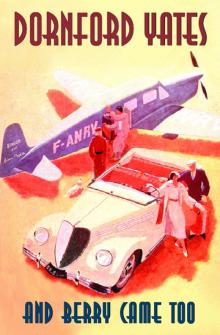 And Berry Came Too
And Berry Came Too Valerie French (1923)
Valerie French (1923) Brother of Daphne
Brother of Daphne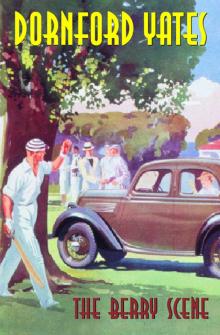 Berry Scene
Berry Scene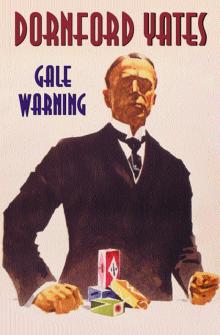 Gale Warning
Gale Warning B-Berry and I Look Back
B-Berry and I Look Back Storm Music (1934)
Storm Music (1934) House That Berry Built
House That Berry Built